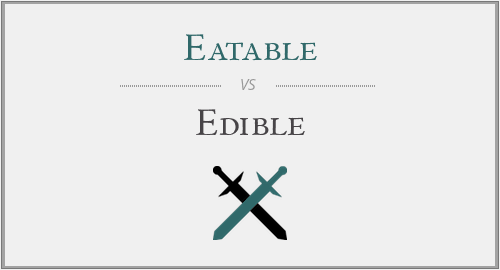With “eatable” and “edible”, it is clear that the matter isn’t about similar spelling or about doubting whether one word is correct and the other is wrong, invented or misspelled. Both words are known as correct, and probably every English user can deduct what they refer to. And this, in fact, is what actually raises questions: if they both refer, broadly, to the same thing…what is the difference, then, between them?
We are going to closely analyze “eatable” and “edible” for you, and help you understand the slight difference between them. Keep reading to get everything clear in your mind and to make sure that you will always use them correctly.
Eatable vs. Edible
It is already clear enough that “eatable” and “edible” both refer to things that can be eaten, things that aren’t toxic for the body and which can be consumed without harmful consequences for the organism. So, at a superficial linguistic level, they can be considered quite close synonyms.
At a deeper level, anyway, there is something that makes “eatable” slightly different from “edible”. More exactly, “eatable” is a more modern word, which doesn’t only refer to something that can be consumed without harm, but which also implies the idea of good taste, of somehow flavorful, tasty food, or at least of an aliment with agreeable taste. “Edible”, on the other hand, only implies the possibility of consumption without harmful consequences. Therefore, if we were to compare the two adjectives, “eatable” means more than “edible”. In other words, for something to be “eatable”, it needs to be both “edible” and with an agreeable flavor.
When do we use “eatable”?
“Eatable” is a modern adjective, describing something that can be consumed safely, without harmful consequences for the body, and which also has an agreeable taste, with a nice flavor, which can be enjoyed.
Example: This fruit is ok, it’s actually eatable. Taste it, it’s sweet and perfumed! – “eatable” is an adjective that describes something safe to be consumed, with an enjoyable taste.
When do we use “edible”?
“Edible” is an adjective that implies less than “eatable”. It describes something that can be eaten, something that can be consumed without harmful consequences upon the organism. This doesn’t necessarily mean that it is also tasty or enjoyable. It is simply referring to something safe to be consumed in order to survive and suppress hunger.
Example: He found some edible berries on the island – they tasted bad, but that’s how he survived until he was found. – “edible” is an adjective that describes something safe to be consumed, not necessarily with an enjoyable taste.
Conclusion
To keep it short, something that is “edible” doesn’t have to be “eatable”. Something that is “edible” is simply safe to consume in order to survive, while something that is “eatable” is both “edible” and enjoyable due to its taste. That is the difference that can slightly be observed between “eatable” and “edible”.





Have a discussion about this article with the community:
Report Comment
We're doing our best to make sure our content is useful, accurate and safe.
If by any chance you spot an inappropriate comment while navigating through our website please use this form to let us know, and we'll take care of it shortly.
Attachment
You need to be logged in to favorite.
Log In